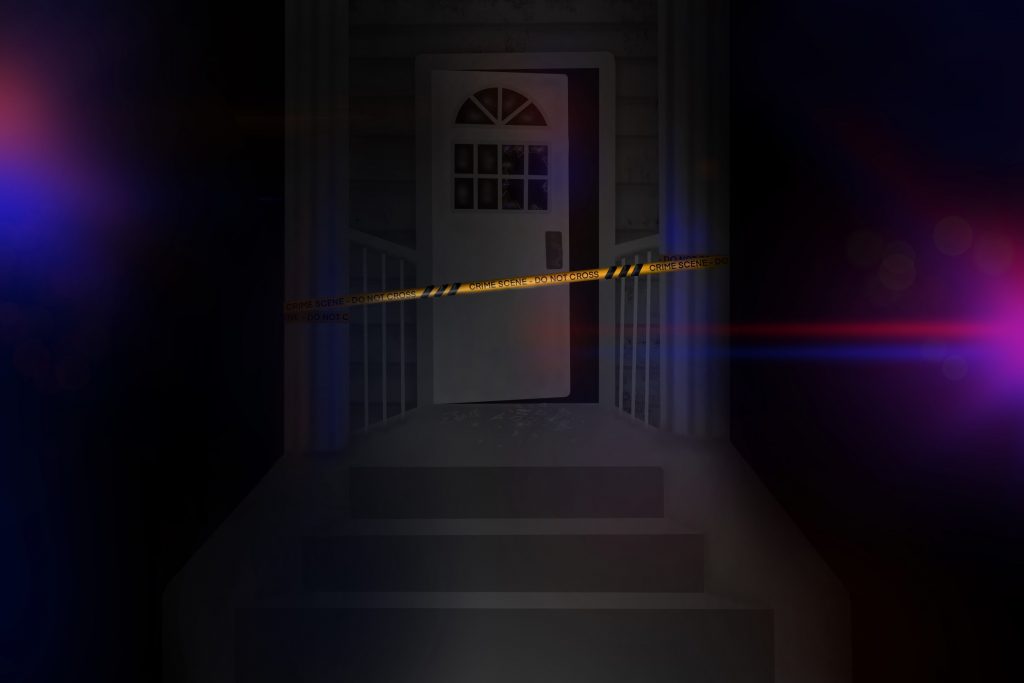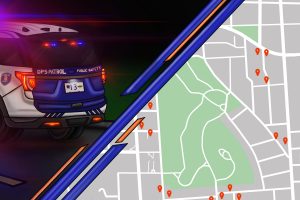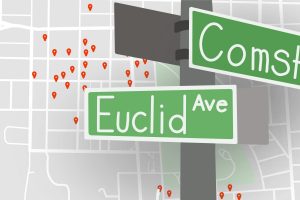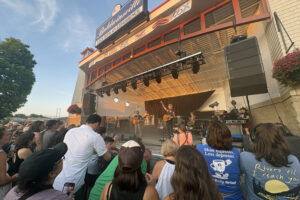Moving forward from the aftermath of a burglary
Moving forward from a break-in

What follows a break-in experience can vary both by circumstance and person, and it can leave not only a financial impact, but an emotional one as well. Replacing stolen things becomes a hassle on top of dealing with the police, landlords and even insurance companies. It’s also common for victims of a break-in to feel like their space and security have been violated.
The majority of college students who decide to move off-campus become first-time renters and enjoy the freedom that comes with it. Unfortunately, this has led some Syracuse students to become victims of either a car or home break-in.
Deputy Chief of the Department of Public Safety John Sardino says “everybody’s a little bit different” and the impact of these break-ins “really varies by person.” There’s no set formula for how an experience will affect someone and it can take time for any aftermath to be felt.
“Being a victim of a crime can be really traumatic, more so than I think people really understand,” Sardino said.
Sardino consistently reiterated that it’s never the victim’s fault.
“I wish there was some magic potion I could give somebody and be like, ‘Hey, this is not your fault in any way, shape or form. Nobody should be going into your house, nobody should be violating you. No matter what it is you did or think you did,’” Sardino said.
The break-in incidents DPS have seen are primarily crimes of opportunity, as noted in their public safety information notice emails. This means that the burglars have entered through unlocked windows and doors.
“Most people that aren’t criminals don’t think about things that can happen,” Sardino said. “You know, they’re honest people.”
He explained that most college students don’t pass by a window or door and question if it’s unlocked, let alone consider entering that home or car. While following up with a break-in on Ackerman Avenue, a member of the Syracuse Police Department agreed that it’s not necessarily an ingrained mindset.
“It’s not your fault. You should lock your stuff, right? But you should also be able to feel like you’re in a safe environment,” said an SPD detective following a break-in on Ackerman Avenue. “I think that it’s the college mindset — I mean, I had it myself — to think, why would this sort of thing happen?”
The number of students who have experienced some form of break-in continues to grow. Every individual’s experience is different but they all have an aftermath story. Here are a few students who agreed to share their stories to foster a conversation and spread awareness. For those without experience already, try taking some preventative safety measures.
“The idea that someone came into our second floor, was there, just around, and then took the keys and left while I was asleep was a terrifying idea to me,” said Kamileh Rivera, who was a junior at Syracuse University.
Rivera and her roommates were burglarized this past February in the middle of the night. Her roommate’s keys were taken from the house and their car was stolen out of the back parking lot. They were renting the top two floors of a house on Ackerman Avenue.
“I was on the second floor and then one of my roommates was on the third floor. She heard them talking and walking around but she didn’t think we were being robbed. She thought it was like, someone came home and brought people over,” Rivera said.
Like most students, they have admittedly left their door unlocked on occasion. Rivera also said prior to the break-in, their doorknob was outdated and “weird” which is a common trend among the older homes in the university neighborhoods making them “easy targets,” Sardino explained.
They didn’t initially notice the break-in until her roommate’s car was nowhere to be found, Rivera said.
“We got broken into on a Wednesday and she noticed her car was gone on Friday. It was a pretty big chunk of time but she doesn’t really use it that much so no one was really paying attention to it,” Rivera said. “We put the pieces together and realized that we had been broken into.”
Rivera and her roommates called the SPD to file a report for the missing car. They also contacted their landlord to request he change their locks.
“No matter how the person got into the house, they got into the house somehow. On our front door, the hinge was so bad that even if it was locked you could wiggle it around and push it and be able to come in,” Rivera said. “So he changed it, but he still charged us like 30 bucks for a new one. I was like, ‘Okay, great. This is like what safety costs, I guess?’”
In addition to agreeing to change the locks, their landlord told them to check the street cameras but Rivera said that this was the extent of his involvement. She says they also never contacted the school about the experience or used their services. Instead, her friends stepped in as her support system.
“It was very anxiety-inducing for the first couple of days,” Rivera said. “My friends were kinda like my therapists. They really comforted me. And even the first couple nights I didn’t really feel safe staying in the house alone. So, they let me crash at their apartment for a couple nights.”
“Just again, the idea that someone came in so easily while I was sleeping. You know how you sometimes wake up in the middle of the night and get hungry or whatever,” Rivera said. “It just scared me to think that I could have woken up, not knowing anything, gone out of my room and it could have been a different story.”
Following the break-in, Rivera says she’s become more cautious with a lot of things. Before going to bed she goes out of her way to double-check that the doors to the house are locked by pulling on them. She says she’ll also double, even triple check her car is locked and none of the windows are open. Rivera also became more cautious while walking after dark.
“No matter if it’s like a social night where everyone’s out, I still feel kind of sketched out by it,” Rivera said. “If it’s dark out, I’ll call someone because I just don’t feel super safe walking alone, which is unfortunate and that can happen even without a robbery. But after that, it was kind of heightened.”
Rivera ended up living on Ackerman out of convenience and “rolled with” wherever her friend wanted to live. She says crime didn’t originally play a factor in where she lived but it’ll be a factor in the future.
“I remember getting the feel of it and living there [at the start of the year] and then all of a sudden getting so many emails about robberies down the street or a street over was still kind of like, ‘Oh, this is interesting.’”
Rivera and her roommates have invested in Ring cameras for both their front and back yards since the burglary. And to any student who may experience a break-in, Rivera points to friends as a good method of getting back to normal.
“I would say like, even though it’s very anxiety-inducing to try to surround yourself with positive people. I know that sounds cheesy, but that’s what really calms me,” Rivera said.
After sharing her original story, Rivera and her housemates experienced a second break-in on May 4. The burglars came in through the first floor window of the bottom apartment and then accessed her apartment once they were inside.
Rivera says they went through her roommates’ things and attempted to enter her room but she had the door locked. The burglars were only able to steal money from their apartment but took more from their downstairs neighbors.
“The second time around was way more scary because you don’t think it will happen again and it happened again,” Rivera said. “I was already feeling anxious about the week and personal life and this time around my anxiety went through the roof. It was very unsettling.”
“The world is not out to get me. They’re doing this to all these people and they have no idea who they’re targeting,” said Robert Roosa, who was an SU senior living off-campus on Lancaster Avenue.
Near the beginning of this past October, Roosa and his roommates woke up to realize their house had been broken into the night before while they were asleep. He believes the burglars came through an unlocked back door where they then found a bowl of the house member’s “grab and go” items.
“They took two people’s wallets. They took my wallet. They took my car keys and they took another one of my roommates’ car keys. And they stole two cars from my house,” Roosa said. “So, the next morning we wake up and we’re like ‘where the f**k are the cars?’ obviously.”
They immediately called the SPD who came out and “somewhat investigated” but were “not very helpful” as Roosa recalled. At the time, he remembered receiving an email a few months prior to the incident regarding an increase in camera surveillance surrounding campus.
“There was actually a camera facing right at our house. Like, the camera definitely would have seen our driveway and the police refused to even look at the camera,” Roosa said.
Roosa says his housemates weren’t given an exact reason as to why the police refused to look into the cameras but were told that it’s typical for one or two cars to be stolen a night within the city of Syracuse.
“They essentially just played it off. Just like, we’re not putting that much effort into it,” Roosa said.
Roosa and his roommate were able to locate their cars through Onstar tracking the next day where the burglars had ditched the cars, both luckily undamaged. He says the police then took the cars into their possession to be searched for evidence, and they were impounded for over two weeks.
“It was kind of ridiculous, the fact that they found them the day after they were stolen and for some reason they sat in Syracuse police’s impound lot for two weeks,” Roosa said.
“I went to try and get my car back and because obviously I’m a student, it’s technically under my dad’s name. They ended up making my dad go get a notarized note from a notary public and having me bring that to them saying that that car could be released to me,” Roosa said. “I don’t know, I was fuming at the Syracuse police. We were very, very angry.”
In addition to the inconvenience of reclaiming their cars, Roosa mentioned their household shared an uneasy feeling after the break-in, feeling violated and their safety compromised. He says the experience was “eye-opening” and to this day will get him out of bed in the middle of the night to check if the door is locked if he’s not positive.
“It’s definitely made me live much more on my toes I would say and like a good wake up call, but I don’t know, not something that people necessarily need to go through,” Roosa said.
He said that although time has helped, the break-in definitely had a lasting effect on his general thoughts on crime and his own personal safety, as well as making him less trusting of the SPD. Roosa also finds comfort knowing he wasn’t a target and isn’t alone in his experience.
“Knowing that a lot, a good amount, of kids goes through this kind of made it easier for me to be like alright this just isn’t like the world against me,” Roosa said. “This is just like the s–t that people go through and you’ve got to just deal with it like everyone. A lot of people around here are going through the same thing right now. So, I don’t know, it kind of helped ease it in my mind.”
On October 15 last year, the Syracuse football team lost to Clemson. Marissa Solomon, who was a Syracuse senior, spent her night at the game while also celebrating her roommate’s birthday. She doesn’t remember this game for Syracuse’s performance but unfortunately recounts it as the precursor to her household’s break-in.
Solomon says they had a tailgate at their house on Livingston Avenue and then went to the game. However, she went home early and was in bed around 10:30 p.m. when she thought she heard her roommate and her boyfriend come home.
“It was not. But I didn’t realize that,” Solomon said. “So usually, when they come home, they open my door and say goodnight. I was like half asleep, my door opens and I’m expecting them to walk through but it was like this man in a ski mask with a backpack.”
“So, he walks in. He’s dead silent. I don’t think he was expecting me to be there. I sat up in my bed and I just screamed at him,” Solomon said.
Armed with her sorority paddle, Solomon chased the man back down her stairs from the second floor and out of the house, locking the door behind him. She explained it was horrifying but in the moment her instincts kicked in before she could even think of it in that way.
“It was fight or flight, and there was no flight option. Like where was I supposed to go? In my room? It’s supposed to be like, you know, that kind of centering area, that kind of privacy that you have, and that was violated,” Solomon said.
From there, Solomon went back upstairs to wake up her one roommate who was home at the time and check her other roommates’ rooms to see if anything was out of place. Solomon remembers stepping back into the hallway and seeing a 12-year-old boy standing there in a hoodie and plastic surgical gloves. Solomon grabbed him by the hoodie which she admits “in hindsight is very stupid” but she began to question him.
“I was like, you’re not leaving my house until you tell me who you are and who your friend is and why you’re here. And he wouldn’t say anything except his name is Jay. ‘He made me do it. He made me do it,’” Solomon said.
Solomon says at this point her roommate came down the stairs, screaming at the sight. As this is happening, the intruder attempted to hit the roommate over the head with his flashlight and tried to exit the house but was blocked by Solomon.
“All of a sudden there’s banging on the windows and banging on the front door and the other guy comes back. And he’s holding up this big JBL speaker that he had taken from our living room,” Solomon said. “And he’s pointing at the speaker and pointing at the little kid as if that’s a trade. The speaker for this child.”
During this distraction, the boy left through an old, faulty window where the SPD suspects the burglars entered the house from, Solomon said. The man in the ski mask dropped the speaker on the porch and they disappeared. Solomon and her roommate contacted their other roommates and the SPD. They discovered that the intruders had stolen a laptop, Airpods and a North Face backpack filled with the roommate’s passport, social security card and vaccination card.
Following the incident, Solomon says the SPD set up more patrols on their street for a period of two weeks but did end up dropping their case. She explained this was kind of upsetting but also a relief in a way.
“My issue with pursuing legal action was, one, morally I felt bad putting this 12-year-old boy who was potentially coerced into this burglary into the legal system. That did not sit well with me,” Solomon said.
Solomon also recognized that she was potentially the only roommate who would be able to testify in person and said she “wasn’t ready in that moment to relive it again.” She says after the break-in she reached out to the university and began seeing a trauma specialized therapist through the Barnes Center until the end of the semester. The therapist also put her in contact with someone else from the school who was able to help Solomon manage her school absences while she focused on her mental health.
“In the days after, you just kind of sit with yourself and I think I blamed myself for a lot of it. Like, were there things I could have done differently? And would that have made it any better? But you just have to understand that sometimes things don’t happen for a reason. There’s no reason. There’s nothing behind it, except that it was completely random and now you just have to deal with the effects of it,” Solomon said.
“It was hard to make the two that weren’t home kind of understand the gravity of it and how much it affected me afterward,” Solomon said.
She explained that bridging this disconnect was hard at first but expressing the lingering impact she felt eventually bettered their communication.
Solomon and her roommates also installed a home security alarm system with motion detectors on every window and every door, despite their landlord’s disapproval because it had to be hardwired into the house.
“We told them we were installing it anyway,” Solomon said. “We were like, if anything, this is like a rental selling point, having a security system.”
“I thought I was safer at U Point and this parking lot. Somehow, I felt like this would be protected because it’s an actual apartment building, not just a random off-campus student house. But yeah, it definitely changed,” Samantha Taylor said.
Taylor, who was a Syracuse senior living in the U Point apartment complex, had her car broken into. She was walking back from class one afternoon and went to the lot behind her apartment building to grab something from her car when she realized something was wrong, she said.
“Immediately, I noticed there was stuff thrown about my car. My glove compartment was open. There was my car registration on the floor. I keep candy in my car for my blood sugar and that was thrown everywhere and there were masks everywhere in my car,” Taylor said.
“I got in the car and I was like, okay, someone obviously broke-in. And then I looked for broken windows, but there was nothing like that,” Taylor said. “My first thought was to call my dad. So, I called him being like, ‘what do I do?’”
Her dad told her to take pictures of everything how it was and then speak to the U Point building manager. Taylor says she wasn’t keeping anything of value in her car, so nothing was stolen that she noticed. When speaking to the building manager, he looked “really shaken up” and didn’t seem like he wanted to put the message out, Taylor said.
“It was just really weird to me because I thought living in U Point – there’s like security cameras and it’s an apartment building and there’s a parking lot and there’s a bunch of other cars around. I just didn’t think my car would be a target,” Taylor said.
Taylor filed a report with both the SPD and U Point but didn’t hear anything after that, she said. She assumed it was because she didn’t identify anything missing from the car. Aside from the mess inside, the only damage to her car was scratches around the lock on her door handle.
“I don’t know if someone used a key to open it or something or if that’s possible, but I was surprised there was no broken glass,” Taylor said. “My car has an automatic lock, so once I get a certain distance away it locks.”
Taylor says she has friends who have had their cars broken into or their windows smashed who live in houses off-campus, but this is the first she’s heard of an instance in an apartment building. Security was a consideration when she chose where to live and she viewed an apartment building as a safer option.
“I just preferred the idea of having a doorman, having the lock on the door to get in and the idea of like, your car is a lot with a bunch of other cars. It’s not just like parking on the street or in the driveway,” Taylor said.
Since having her car broken into, Taylor says she has a heightened awareness of possible crime and has noticed herself acting extra cautious by double-locking her car door and surveying the area when she walks from her car into the apartment complex alone at night. She also continues to not leave anything of value behind in her car.
“Mine wasn’t so serious compared to others who’ve actually gotten their windows smashed and had to fix it or gotten a laptop stolen,” Taylor said. “But just like knowing someone else was in my car and then they’re touching all of my things and throwing stuff about… it was just really uncomfortable, I guess, just to know that.”
Before this experience, Taylor says she knew Syracuse was “not the safest city in the world” and had heard stories since starting school here freshman year. It feels like more of a reality now though, she said.
“I’ll always have in the back of my mind now that’s a possibility,” Taylor said. “Now that it’s personally happened to me, I think it just actually cemented that knowledge in my head and I’m just more aware of it and more aware of what could happen. So I guess just keeping it in the back of your mind would be valuable.”








